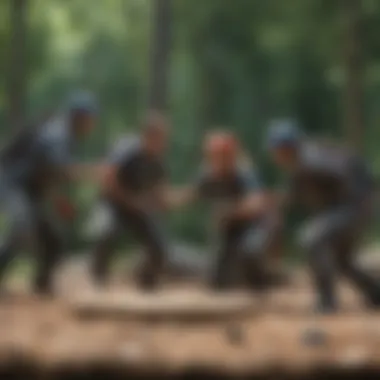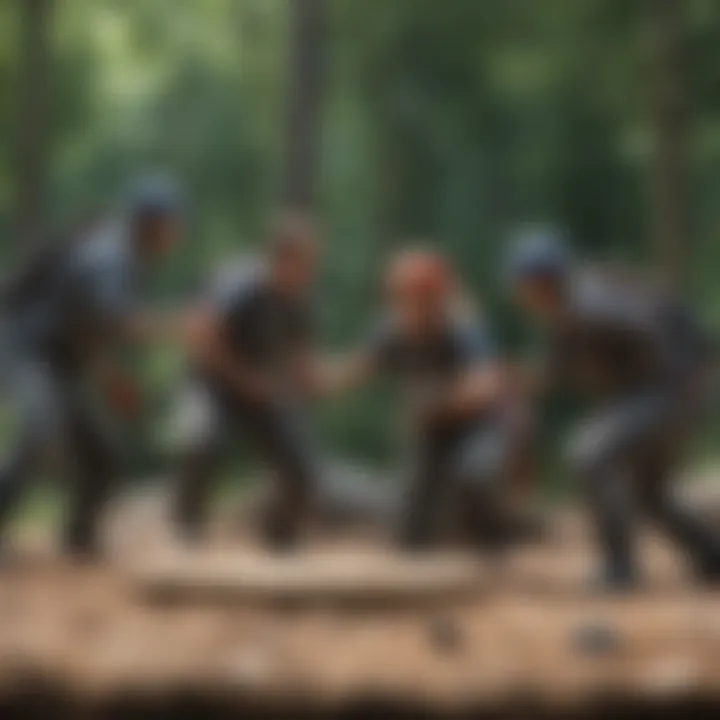Unlocking Creativity: Innovative Ideas for Memorable Work Team Outings


Entrepreneurial Insights
CRM Strategies
In the realm of CRM (Customer Relationship Management), understanding the importance of CRM in business operations is crucial for optimizing customer interactions. Choosing the right CRM software is a strategic decision that can impact the efficiency of customer management. Implementing CRM best practices entails aligning the software with the organization's objectives to enhance customer satisfaction and loyalty.
Business Sales Techniques
For small business owners and sales professionals, mastering effective sales strategies is imperative for driving revenue growth. Developing strong sales communication skills enables professionals to articulate value propositions persuasively. Techniques for closing deals and negotiation tips are essential components to ensure successful sales outcomes and maintain a competitive edge in the market.
Industry Trends and Analysis
Entrepreneurs and corporate executives can benefit from staying abreast of market trends that influence business operations. Leveraging data-driven insights is key for deriving strategies that contribute to successful sales initiatives. Understanding industry trends enables entrepreneurs to make informed decisions and adapt business practices to meet evolving market demands.
Case Studies and Real-life Examples
Examining real-world examples of CRM integration and successful sales campaign case studies offers practical insights for aspiring entrepreneurs and small business owners. By exploring real-life scenarios, individuals can glean valuable lessons on implementing effective CRM strategies and executing successful sales campaigns. Drawing inspiration from success stories can further motivate entrepreneurs in achieving their business objectives.
Adventure-Based Outings
Adventure-based outings play a pivotal role in enhancing team dynamics and fostering a sense of camaraderie among team members in a professional setting. Such activities offer a unique opportunity for participants to challenge themselves, step out of their comfort zones, and develop valuable skills that can be translated into the workplace. By immersing team members in unfamiliar and exhilarating environments, adventure-based outings encourage collaboration, communication, and problem-solving in a non-traditional setting.
White-Water Rafting Expedition
Choosing a Scenic River Location
Selecting a scenic river location is paramount in ensuring a memorable white-water rafting experience for the team. A picturesque setting not only adds to the overall enjoyment of the activity but also creates a soothing backdrop for team members to unwind and connect with nature. Factors such as water levels, rapids intensity, and accessibility are crucial considerations when choosing a river location.
Incorporating Team Building Exercises
Integrating team building exercises during a white-water rafting expedition amplifies the benefits of the experience. By engaging in collaborative challenges while navigating the rapids, team members learn to trust each other's abilities, communicate effectively under pressure, and develop a strong sense of unity. These exercises enhance teamwork skills and contribute to a more cohesive work environment.
Ensuring Safety Measures
Prioritizing safety measures is non-negotiable in any white-water rafting expedition. Providing comprehensive safety briefings, ensuring all team members have appropriate gear, and having experienced guides onboard are essential for mitigating risks and ensuring a smooth and secure adventure. Safeguarding the well-being of participants fosters trust and reinforces the commitment to each team member's welfare.
Rock Climbing Challenge
Selecting a Suitable Rock Climbing Site
Choosing a suitable rock climbing site involves assessing various factors such as difficulty level, terrain features, and safety considerations. Opting for a site that caters to different skill levels within the team ensures that everyone can participate and contribute to the challenge. Access to professional rock climbing facilities and well-maintained routes enhances the overall climbing experience.
Providing Professional Instruction
Professional instruction is instrumental in ensuring a safe and rewarding rock climbing experience for all team members. Trained instructors not only guide participants through proper climbing techniques but also provide valuable insights on risk management and problem-solving strategies. Their expertise creates a supportive learning environment that encourages skill development and boosts confidence.


Emphasizing Trust and Communication
Emphasizing trust and communication during a rock climbing challenge reinforces key team dynamics essential for success. Encouraging team members to communicate effectively, offer assistance, and trust their belayers instills a sense of reliance and interdependence. The reliance on clear communication and trust-building exercises strengthens bonds within the team and fosters a collaborative spirit.
Creativity-Enhancing Activities
Creativity-Enhancing Activities play a pivotal role within this article, catering to the diverse preferences and needs of work teams. By engaging in activities that spark creativity, teams can enhance their problem-solving skills, foster innovation, and strengthen collaboration. Creativity-Enhancing Activities offer a break from routine tasks, allowing team members to think outside the box and explore new ideas. These activities promote a positive work environment by nurturing individual creativity and collective teamwork.
Art Jamming Session
Gathering Art Supplies
Gathering Art Supplies is a fundamental aspect of the Art Jamming Session. Choosing the right supplies sets the tone for the creative experience and ensures that participants have all the necessary tools to unleash their artistic talents. By providing a wide array of art materials, from paints to brushes to canvases, this session encourages team members to express themselves freely and explore different mediums. The diversity of supplies allows individuals to experiment and showcase their creativity uniquely.
Encouraging Collaborative Art Projects
Encouraging Collaborative Art Projects enhances teamwork and communication skills among team members. By working together on a single art piece or a unified theme, participants learn to appreciate each other's perspectives, ideas, and strengths. Collaborative art projects promote a sense of unity and shared achievement, fostering a cohesive team spirit. This cooperative approach also encourages creativity from a collective standpoint, blending individual styles into a harmonious masterpiece.
Fostering a Relaxing Environment
Fostering a Relaxing Environment during the Art Jamming Session creates a calming and inspirational atmosphere for team members. By providing soothing music, comfortable seating, and gentle lighting, this environment helps reduce stress and encourages a free flow of creativity. A relaxed setting allows individuals to focus on their art without distractions, promoting mindfulness and artistic exploration. Team members can unwind, de-stress, and recharge creatively in a tranquil space.
Cooking Class Experience
Selecting a Culinary Theme
Selecting a Culinary Theme adds excitement and purpose to the Cooking Class Experience. By choosing a specific cuisine or cooking style, teams can immerse themselves in a culinary journey that enhances their teamwork and creativity. A themed cooking class not only teaches practical kitchen skills but also fosters cultural appreciation and culinary diversity. The selected theme sets the tone for the cooking adventure, motivating team members to work together towards a delicious common goal.
Promoting Teamwork in the Kitchen
Promoting Teamwork in the Kitchen emphasizes collaboration, communication, and coordination among team members. Cooking together requires synchronized efforts, task delegation, and mutual support to create a successful dish. Teamwork in the kitchen promotes leadership skills, time management, and adaptability under pressure. By working towards a shared objective, team members learn to trust each other, solve problems collectively, and celebrate their culinary achievements as a unified group.
Enjoying the Fruits of Labor
Enjoying the Fruits of Labor culminates the Cooking Class Experience with a shared meal that reflects the team's efforts and creativity. Sitting down to enjoy the dishes prepared together fosters a sense of accomplishment and camaraderie. Team members can savor the flavors they have created, bond over a delicious meal, and appreciate the fruits of their labor. Sharing a culinary experience strengthens relationships, boosts morale, and leaves a lasting impression of collaboration and success.
Wellness Retreats and Relaxation
Wellness retreats and relaxation play a crucial role in fostering a positive work environment and enhancing team dynamics within a professional setting. In the realm of work team outings, prioritizing wellness allows team members to recharge, de-stress, and refocus, ultimately leading to increased productivity and morale. The concept of wellness retreats encompasses various activities aimed at promoting mental and physical well-being, making it a holistic approach to team building.
Yoga and Meditation Workshop
Finding Serene Venue Options
Finding serene venue options is paramount in the success of a yoga and meditation workshop during team outings. Serene locations such as tranquil gardens, peaceful mountainsides, or scenic waterfronts create an ideal setting for relaxation and introspection. The peaceful ambiance of these venues fosters mindfulness and encourages participants to connect with their surroundings, enhancing the overall experience.
Practicing Mindfulness Techniques


The practice of mindfulness techniques in a yoga and meditation workshop contributes significantly to the overall well-being of team members. Mindfulness techniques enable individuals to be present in the moment, heighten their self-awareness, and reduce stress levels. By incorporating mindfulness practices such as conscious breathing and body scanning, participants can cultivate a sense of inner peace and mental clarity, beneficial for team cohesion and stress management.
Rejuvenating Body and Mind
Rejuvenating the body and mind is a key component of a yoga and meditation workshop during team outings. Through gentle yoga poses, guided meditation, and relaxation exercises, participants can release physical tension, quiet the mind, and rejuvenate their energy levels. This rejuvenation process not only improves overall wellness but also enhances focus, creativity, and emotional resilience among team members.
Spa Day Treat
Selecting a Luxurious Spa Facility
Choosing a luxurious spa facility for a spa day treat elevates the experience of team members, offering them a pampering escape from daily routines. Luxurious spas provide a range of indulgent treatments, soothing environments, and top-notch amenities that cater to the needs of each individual. The opulence and serenity of a premium spa facility create a sense of luxury and exclusivity, enhancing the overall relaxation and enjoyment for team members.
Indulging in Pampering Treatments
Indulging in pampering treatments at a spa day treat not only promotes physical relaxation but also uplifts the mood and enhances well-being. Spa treatments such as massages, facials, and body scrubs relieve muscle tension, promote circulation, and rejuvenate the skin, leaving team members feeling refreshed and revitalized. The indulgence in these treatments promotes self-care and self-appreciation, contributing to a positive mindset and team camaraderie.
Relaxing and Unwinding Together
Relaxing and unwinding together at a spa day treat cultivates a sense of togetherness and shared experience among team members. Spending time in relaxing environments, engaging in treatments, and unwinding in communal spaces foster connections and bonding opportunities within the team. The act of collectively decompressing and rejuvenating promotes empathy, understanding, and relaxation, creating a harmonious atmosphere that transcends into the work environment.
Team-Building Workshops
In the realm of work team outings, Team-Building Workshops stand as an essential pillar for nurturing collaboration and unity among team members. These workshops play a pivotal role in fostering a positive work environment by encouraging communication, trust, and problem-solving skills. By immersing participants in interactive activities and challenges, Team-Building Workshops offer a platform for colleagues to bond outside the constraints of the workplace. The structured nature of these workshops allows individuals to discover each other's strengths and weaknesses, thereby enhancing teamwork and boosting overall morale. Additionally, Team-Building Workshops serve as a catalyst for improving productivity and efficiency within the team dynamic. Incorporating such workshops into work outings can lead to long-lasting benefits, elevating team cohesion and performance.
Escape Room Challenge
Choosing an Intriguing Escape Room Theme
When contemplating the selection of an intriguing Escape Room theme for a team outing, one must consider the impact of such choice on the overall objective of promoting teamwork and problem-solving skills. The essence of selecting an intriguing theme lies in stimulating the participants' curiosity and engagement, thereby fostering a sense of shared purpose. An ideal Escape Room theme should offer a balance between challenge and enjoyment, ensuring that all team members are actively involved in deciphering clues and unraveling mysteries. The uniqueness of the chosen theme should spark creativity and cooperation among participants, encouraging them to think outside the box and communicate effectively. While an intriguing Escape Room theme can enhance the overall experience of the outing, it is vital to align the theme with the team's preferences and capabilities to maximize the benefits derived from this activity.
Solving Puzzles and Riddles as a Team
Engaging in puzzle-solving and riddle challenges as a team during an Escape Room experience can significantly contribute to promoting collaboration and problem-solving skills. The aspect of teamwork while unraveling puzzles cultivates a sense of unity and mutual support among team members. By collectively tackling intricate riddles and solving complex puzzles, participants learn to leverage each other's strengths and expertise, fostering a spirit of camaraderie. The experience of working together to overcome mental challenges not only boosts morale but also instills a sense of achievement and satisfaction within the team. However, it is crucial to ensure that the level of difficulty in the puzzles is manageable to prevent frustration and disengagement among participants, thereby optimizing the team's bonding experience.
Encouraging Critical Thinking and Collaboration
Encouraging critical thinking and collaboration within the framework of an Escape Room Challenge can enhance the problem-solving skills and decision-making abilities of team members. By presenting scenarios that require analytical thinking and strategic planning, participants are compelled to communicate effectively and delegate tasks based on individual competencies. The emphasis on critical thinking encourages team members to assess situations from multiple perspectives, fostering innovative solutions and creative approaches to problem-solving. Additionally, promoting collaboration through group discussions and active participation reinforces the idea of collective effort and shared achievement. Encouraging critical thinking and collaboration during an Escape Room Challenge not only strengthens the bond within the team but also hones essential skills that are transferable to the professional setting, making it a valuable component of work team outings.
Outdoor Survival Training
Learning Essential Survival Skills
The incorporation of outdoor survival training into work team outings serves as a practical approach to instilling essential skills and knowledge among participants. Learning vital survival skills, such as fire-making, first aid, and shelter-building, not only equips team members with life-saving capabilities but also fosters a sense of preparedness and self-reliance. By immersing individuals in outdoor scenarios that simulate challenging situations, participants are compelled to adapt to unfamiliar environments and collaborate effectively to ensure collective survival. The acquisition of these fundamental skills not only enhances the confidence and resilience of team members but also cultivates a mindset of resourcefulness and quick thinking, which are invaluable traits in professional settings that require adaptability and problem-solving abilities.
Navigation and Shelter-Building Exercises
Engaging in navigation and shelter-building exercises during outdoor survival training sessions contributes to developing teamwork and practical skills essential for overcoming obstacles in challenging environments. The aspect of navigation challenges team members to rely on one another's directions and map-reading skills, promoting clear communication and coordination. Constructing shelters collaboratively requires innovative thinking and division of tasks, highlighting the importance of mutual support and efficient teamwork. These exercises not only improve the spatial awareness and problem-solving capabilities of participants but also reinforce the significance of effective communication and cooperation in achieving common goals. Emphasizing navigation and shelter-building exercises in outdoor survival training enhances the team's ability to adapt to unpredictable circumstances and reinforces the importance of unity and coordination in overcoming challenges.


Emphasizing Team Cohesion in Challenging Scenarios
Emphasizing team cohesion in challenging scenarios during outdoor survival training accentuates the significance of unity and solidarity among team members. By navigating through demanding terrains and undertaking survival tasks as a collective effort, participants learn the value of mutual trust and support in high-pressure situations. The emphasis on team cohesion instills a sense of responsibility towards each other's well-being and fosters a collaborative spirit essential for overcoming obstacles as a team. Encountering challenging scenarios together not only strengthens the bond among team members but also cultivates a culture of teamwork and resilience. Emphasizing team cohesion in challenging scenarios serves as a valuable lesson in fostering cooperation, leadership, and adaptability within the team, making it a transformative experience that aligns with the objectives of work team outings.
Culinary Exploration Tours
In the realm of team outings, Culinary Exploration Tours offer a delightful blend of gastronomic adventures and cultural discoveries. They play a crucial role in broadening culinary horizons, fostering team cohesion, and enriching collective experiences. The act of sharing meals transcends mere sustenance; it embodies a social ritual that binds individuals together through shared sensory pleasures. Exploring different cuisines and flavors can stimulate creativity, encourage open communication, and create lasting memories in a team setting.
Food Tasting Excursion
Visiting Local Food Markets or Restaurants
Venturing into local food markets or restaurants during a Food Tasting Excursion adds a layer of authenticity and community engagement to the outing. It allows teams to immerse themselves in the local food culture, interact with vendors, and savor fresh, regional ingredients. The bustling atmosphere of markets or the cozy ambiance of restaurants provides a vibrant backdrop for team members to connect outside of the office. Sampling street food delicacies or signature dishes from eateries unveils a tapestry of flavors and textures unique to the destination, offering a sensory journey that awakens the taste buds and sparks conversations among participants.
Sampling Authentic Delicacies
Sampling Authentic Delicacies during a Food Tasting Excursion goes beyond mere consumption; it embodies a sensory exploration of a region's culinary identity. Each bite unfolds a story of tradition, innovation, and local expertise, providing a hands-on experience of cultural heritage through food. Tasting traditional dishes or gourmet creations not only pleases the palate but also deepens appreciation for culinary artistry and craftsmanship. Experiencing diverse flavors and culinary techniques cultivates a sense of global awareness and respect for different gastronomic traditions, fostering a spirit of curiosity and discovery within the team.
Enhancing Palates and Building Culinary Appreciation
Enhancing Palates and Building Culinary Appreciation through food tastings instills a deeper understanding of flavor profiles, ingredients, and culinary techniques. Team members develop a nuanced palate, recognizing subtle nuances in taste, aroma, and texture with each sampling. Engaging in discussions about flavor combinations, cooking methods, and food pairings nurtures a culture of culinary appreciation and experimentation within the team. By broadening culinary horizons and fostering a shared enthusiasm for food, Culinary Exploration Tours create a platform for team members to bond over a mutual love for gastronomy, supporting a positive team dynamic and reinforcing camaraderie through shared culinary experiences.
In the realm of work team outings, Interactive Gaming Competitions stand out as a dynamic and engaging option to promote team cohesion and foster a positive work environment. Through strategic gameplay and collaborative challenges, these competitions serve as a platform for enhancing communication, problem-solving skills, and overall camaraderie among team members.
Virtual Reality Gaming Experience
Setting Up VR Stations for Multiplayer Games
Delving into the intricacies of setting up Virtual Reality (VR) stations for multiplayer games opens a gateway to a realm where immersive experiences collide with team dynamics. By creating a simulated environment that encourages interaction and teamwork, VR stations facilitate a unique platform for employees to engage in a shared virtual adventure. The key characteristic of VR stations lies in their ability to transport players into a digital landscape where collaboration and communication are paramount for success. This immersive setting not only fosters creativity but also challenges individuals to think and act in unison, making it a popular choice for team outings seeking to blend technology with team-building initiatives. Despite its advantages in enhancing teamwork and coordination, VR stations may pose challenges such as motion sickness for susceptible individuals, requiring careful consideration when including this element in team outings.
Engaging in Friendly Competition
The essence of friendly competition adds a layer of excitement and motivation to team-based activities, driving participants to strive for excellence while maintaining a spirit of camaraderie. Engaging in friendly competition within a gaming setup fosters a healthy environment where individuals can showcase their skills, learn from one another, and bond over shared challenges. The key characteristic of this aspect lies in its ability to strike a balance between competitiveness and cooperation, ensuring that team members push their limits while also supporting and encouraging their peers. This element is a beneficial choice for team outings as it injects a sense of energy and enthusiasm into the activities, motivating participants to excel whilst fostering a sense of unity. However, it is crucial to be mindful of competitiveness escalating into conflict, emphasizing the importance of sportsmanship and fair play.
Enhancing Team Dynamics through Gaming
The synergy between gaming and team dynamics presents a compelling opportunity to strengthen relationships, boost morale, and improve collaboration within a professional setting. By engaging in gaming activities designed to enhance teamwork, employees can develop a deeper understanding of each other's strengths and weaknesses, thereby maximizing their collective potential. The key characteristic of enhancing team dynamics through gaming is its capacity to simulate real-world scenarios where trust, communication, and strategic thinking are paramount for achieving common goals. This approach is a popular choice for team outings due to its transformative effect on group dynamics, leading to improved synergy and cohesion. While the advantages of enhancing team dynamics through gaming are significant, it is essential to address potential drawbacks such as time constraints and balancing gameplay with productive discussions to ensure a holistic team-building experience.
Board Game Tournament
Delving into the realm of board game tournaments opens doors to a world of strategic thinking, innovative problem-solving, and interactive engagement. By selecting a variety of strategy games for team competitions, organizations can stimulate critical thinking skills, promote friendly rivalry, and encourage lateral thought processes among participants. The key characteristic of this aspect lies in its ability to offer a diverse range of challenges that cater to different skill sets and preferences, fostering a dynamic and inclusive gaming environment. This choice is beneficial for team outings as it provides a platform for individuals to showcase their strategic acumen, promote healthy competition, and foster a sense of community through shared gaming experiences. However, it is essential to navigate potential disadvantages such as game disruptions or unequal skill levels among players, ensuring a fair and rewarding tournament experience.
Selecting a Variety of Strategy Games
When selecting a variety of strategy games for a tournament, organizations can tailor the gaming experience to match the skill levels and interests of participants, thereby creating a balanced and engaging competition. Each game chosen should offer a unique set of challenges that test different aspects of strategic thinking, teamwork, and adaptability, ensuring that every team member has the opportunity to contribute meaningfully to the overall success of their group. The key advantage of selecting a variety of strategy games is its ability to promote diversity in gameplay, allowing individuals to explore different tactics and approaches while honing their problem-solving skills. However, potential disadvantages may arise from game complexity or length, requiring careful consideration of game selection to ensure an enjoyable and stimulating tournament for all involved.
Organizing Team-Based Game Challenges
Organizing team-based game challenges lays the groundwork for collaboration, communication, and mutual support among participants, setting the stage for a spirited and engaging gaming experience. By structuring games that require teamwork and coordination, organizations can foster a sense of unity and purpose within teams, encouraging members to work together towards common objectives. The key characteristic of this aspect lies in its capacity to create a shared mission that empowers individuals to pool their strengths and resources, fostering a culture of interdependency and collective achievement. This approach is a popular choice for team outings as it cultivates a spirit of camaraderie, accountability, and celebration of shared successes. Nevertheless, challenges may arise from coordination issues or differing playing styles, underscoring the need for clear communication and adaptive strategies to overcome obstacles and achieve victory.
Promoting Strategic Thinking and Fun Interaction
Promoting strategic thinking and fun interaction through board game tournaments opens avenues for creative problem-solving, effective decision-making, and social engagement. By structuring games that require strategic planning, critical analysis, and adaptability, organizations can nurture essential skills that are transferable to real-world challenges and workplace scenarios. The key characteristic of this aspect lies in its ability to blend learning with entertainment, offering participants opportunities to exercise their cognitive abilities in a relaxed and enjoyable setting. This choice is beneficial for team outings as it promotes mental agility, fosters strategic thinking, and encourages fun and interactive competition among team members. Despite these advantages, organizations must address potential drawbacks such as game dominance or disengagement, ensuring that gameplay remains balanced, engaging, and inclusive for all participants.







